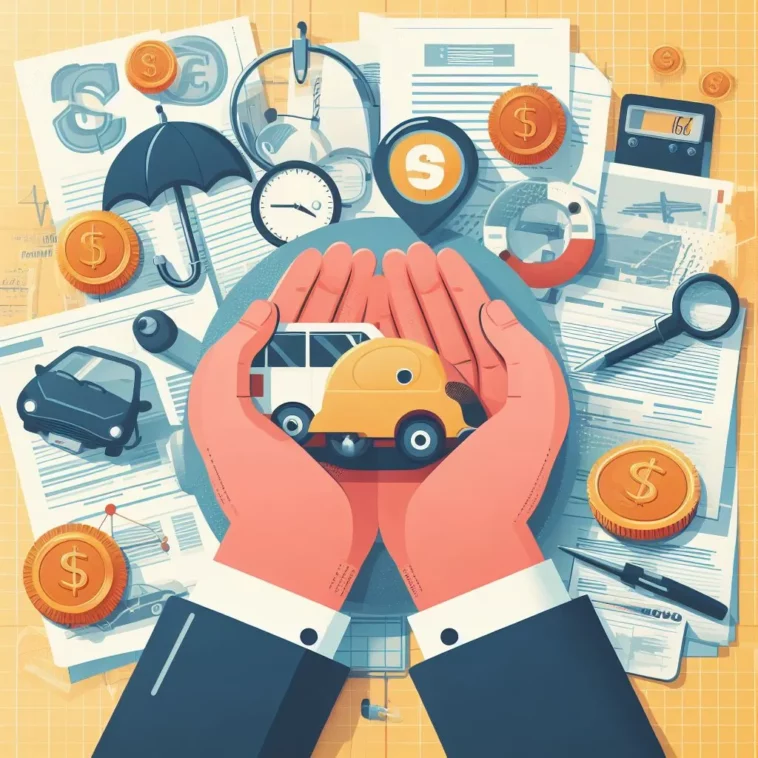Welcome to this article, here we will discuss types of automobile insurance/types of auto insurance coverage, let’s continue.
Types of auto insurance
Auto insurance is a type of insurance that protects you financially from the costs associated with a car accident. It can cover the cost of repairs or replacement of your car, as well as the cost of medical bills and legal fees if you or someone else is injured in an accident.
There are many different types of auto insurance coverage available, and the coverage you need will vary depending on your individual circumstances.
When choosing auto insurance coverage, it is important to consider your needs and budget. You should also compare quotes from multiple insurance companies to get the best deal.
Here are some things to keep in mind when choosing auto insurance coverage:
- Liability coverage: Liability coverage is the most important type of auto insurance coverage to have. It can protect you from financial ruin if you are sued after causing an accident.
- Collision coverage and comprehensive coverage: Collision coverage and comprehensive coverage are important if you have a new car or a car that is worth a lot of money. However, you may be able to drop these coverages if you have an older car or if you can afford to replace your car out of pocket if it is damaged in an accident or stolen.
- Uninsured/underinsured motorist coverage: Uninsured/underinsured motorist coverage is important because it can protect you if you are hit by a driver who does not have insurance or who does not have enough insurance to cover your losses.
- Medical payments coverage and PIP coverage: Medical payments coverage and PIP coverage can be helpful if you are injured in a car accident. However, these coverages are not required in all states.
You should also ask your insurance agent about any discounts that you may be eligible for, such as discounts for having a good driving record, bundling multiple policies, or installing safety features in your car.
By choosing the right auto insurance coverage, you can protect yourself financially from the costs associated with a car accident.tunesharemore_vert
What is auto insurance?
Auto insurance is a type of insurance that protects you financially from the costs associated with a car accident. It can cover the cost of repairs or replacement of your car, as well as the cost of medical bills and legal fees if you or someone else is injured in an accident.
What are the different types of auto insurance coverage?
There are many different types of auto insurance coverage available, but the most common types include:
Liability coverage
Liability coverage is the minimum amount of auto insurance that is required by law in most states. It covers the cost of injuries or property damage that you cause to others in a car accident.
Collision coverage
Collision coverage covers the cost of repairing or replacing your car if it is damaged in an accident, regardless of who is at fault.
Comprehensive coverage
Comprehensive coverage covers the cost of repairing or replacing your car if it is damaged by something other than an accident, such as theft, vandalism, or fire.
Uninsured/underinsured motorist coverage
Uninsured/underinsured motorist coverage protects you if you are hit by a driver who does not have insurance or who does not have enough insurance to cover your losses.
Medical payments coverage
Medical payments coverage covers the cost of medical bills for you and your passengers if you are injured in a car accident.
Personal injury protection (PIP) coverage
Personal injury protection (PIP) coverage covers the cost of medical bills, lost wages, and other expenses if you are injured in a car accident.
Other optional coverage
In addition to the coverage types listed above, there are also a number of other optional auto insurance coverage types available, such as:
- Rental car reimbursement coverage
- Gap insurance
- Roadside assistance coverage
How to choose the right auto insurance coverage for you
When choosing auto insurance coverage, it is important to consider your needs and budget. You should also compare quotes from multiple insurance companies to get the best deal.

Consider your needs and budget
The first step in choosing auto insurance coverage is to consider your needs and budget. Think about how much coverage you need and how much you can afford to pay in premiums.
If you have a new car, you may want to consider collision and comprehensive coverage. If you have an older car, you may decide to drop these coverages if you can afford to replace your car out of pocket if it is damaged in an accident or stolen.
You should also consider your driving history and the location where you live. If you have a bad driving record or live in an area with a high rate of accidents, your premiums will be higher.
Compare quotes from multiple insurance companies
Once you have considered your needs and budget, you should compare quotes from multiple insurance companies. You can get quotes online, over the phone, or in person.
When comparing quotes, be sure to compare the same types of coverage and deductibles. You should also ask about any discounts that you may be eligible for.
Read the fine print carefully on all types of automobile insurance
Before you purchase an auto insurance policy, be sure to read the fine print carefully. This will help you to understand the terms and conditions of the policy on all types of automobile insurance and what is and is not covered.
FAQs
What is the difference between liability and collision coverage?
Liability coverage covers the cost of injuries or property damage that you cause to others in a car accident. Collision coverage covers the cost of repairing or replacing your car if it is damaged in an accident, regardless of who is at fault.
Do I need comprehensive coverage?
Comprehensive coverage covers the cost of repairing or replacing your car if it is damaged by something other than an accident, such as theft, vandalism, or fire. Whether or not you need comprehensive coverage depends on your car and the area where you live. If you have a new car or live in an area with a high crime rate, you may want to consider comprehensive coverage.
What is uninsured/underinsured motorist coverage?
Uninsured/underinsured motorist coverage protects you if you are hit by a driver who does not have insurance or who does not have enough insurance to cover your losses. This coverage is important because it can help you to pay for medical bills, lost wages, and other expenses if you are injured in an accident caused by an uninsured or underinsured driver.
What is medical payments coverage?
Medical payments coverage covers the cost of medical bills for you and your passengers if you are injured in a car accident. This coverage is helpful because it can help to pay for medical bills, regardless of who is at fault for the accident.
What is personal injury protection (PIP) coverage?
Personal injury protection (PIP) coverage covers the cost of medical bills, lost wages, and other expenses if you are injured in a car accident. PIP coverage is required in some states and optional in others.
Example
Imagine you are a new driver who has just purchased a new car. You should consider purchasing collision and comprehensive coverage, as well as uninsured/underinsured motorist coverage. You may also want to consider medical payments coverage and PIP coverage.
Once you have been driving for a few years and have built up a good driving record, you may be able to drop collision and comprehensive coverage if you can afford to replace your car out of pocket if it is damaged in an accident or stolen. However, you should still maintain liability coverage and uninsured/underinsured motorist coverage.
As you get older and your car becomes less valuable, you may want to drop collision and comprehensive coverage altogether. However, you should still maintain liability coverage and uninsured/underinsured motorist coverage.

types of auto insurance coverage Conclusion
Auto insurance is an important purchase that can protect you financially from the costs associated with a car accident. When choosing auto insurance coverage, it is important to consider your needs and budget. You should also compare quotes from multiple insurance companies to get the best deal.
Here are some key points to keep in mind when choosing auto insurance coverage:
- Liability coverage is the most important type of auto insurance coverage to have. It can protect you from financial ruin if you are sued after causing an accident.
- Collision coverage and comprehensive coverage are important if you have a new car or a car that is worth a lot of money. However, you may be able to drop these coverages if you have an older car or if you can afford to replace your car out of pocket if it is damaged in an accident or stolen.
- Uninsured/underinsured motorist coverage is important because it can protect you if you are hit by a driver who does not have insurance or who does not have enough insurance to cover your losses.
- Medical payments coverage and PIP coverage can be helpful if you are injured in a car accident. However, these coverages are not required in all states.
You should also ask your insurance agent about any discounts that you may be eligible for, such as discounts for having a good driving record, bundling multiple policies, or installing safety features in your car.
By choosing the right auto insurance coverage, you can protect yourself financially from the costs associated with a car accident.
Here are some additional tips for choosing auto insurance coverage:
- Be honest with your insurance agent about your driving history and the type of car you drive. This will help them to give you an accurate quote.
- Review your coverage needs regularly and make changes to your policy as needed. For example, if you buy a new car, you may need to increase your coverage limits.
- Keep your insurance information up to date. This will help to ensure that you are properly covered in the event of an accident.
Auto insurance is an important purchase that can protect you financially from the costs associated with a car accident. When choosing auto insurance coverage, it is important to consider your needs and budget. You should also compare quotes from multiple insurance companies to get the best deal.
Here are some key points to keep in mind when choosing auto insurance coverage:
- Liability coverage is the most important type of auto insurance coverage to have. It can protect you from financial ruin if you are sued after causing an accident.
- Collision coverage and comprehensive coverage are important if you have a new car or a car that is worth a lot of money. However, you may be able to drop these coverages if you have an older car or if you can afford to replace your car out of pocket if it is damaged in an accident or stolen.
- Uninsured/underinsured motorist coverage is important because it can protect you if you are hit by a driver who does not have insurance or who does not have enough insurance to cover your losses.
- Medical payments coverage and PIP coverage can be helpful if you are injured in a car accident. However, these coverages are not required in all states.
You should also ask your insurance agent about any discounts that you may be eligible for, such as discounts for having a good driving record, bundling multiple policies, or installing safety features in your car.
By choosing the right auto insurance coverage, you can protect yourself financially from the costs associated with a car accident.
Here are some additional tips for choosing auto insurance coverage:
- Be honest with your insurance agent about your driving history and the type of car you drive. This will help them to give you an accurate quote.
- Review your coverage needs regularly and make changes to your policy as needed. For example, if you buy a new car, you may need to increase your coverage limits.
- Keep your insurance information up to date. This will help to ensure that you are properly covered in the event of an accident.
Auto insurance can be a complex topic, but it is important to understand your coverage options so that you can choose the right policy for your needs. By following the tips above, you can make the process of choosing auto insurance coverage easier and less stressful.
Popular Insurance Reviews
- dan travel insurance reviews
- otto insurance reviews
- safepoint insurance reviews
- platinum supplemental insurance reviews
- southern oak insurance reviews
- arrowhead insurance review
- brightway insurance franchise reviews
- john hancock travel insurance reviews
- hippo home insurance reviews
- pawp pet insurance reviews
Popular articles
- what insurance company covers mounjaro
- will insurance cover ozempic for prediabetes
- how much do dentures cost without insurance
- how to make a successful water leak insurance claim
- How to file a business insurance claim
- business insurance types
- does insurance cover hail damage
- what is auto insurance and why is it important



